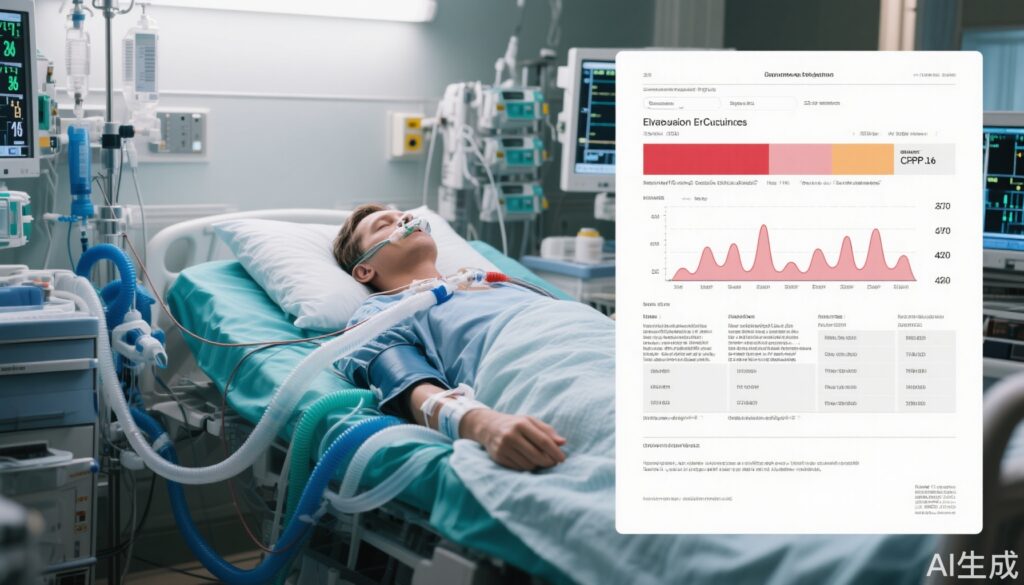Acute myocardial infarction complicated by cardiogenic shock (AMI-CS) remains a critical clinical challenge with high morbidity and mortality rates despite advances in reperfusion and supportive therapies. Systemic inflammation is increasingly recognized as a key pathophysiological component influencing outcomes in AMI-CS, yet the precise impact of inflammatory biomarkers such as C-reactive protein (CRP) on prognosis remains debated. The ECLS-SHOCK trial, a multicenter randomized study, provides a comprehensive dataset to evaluate the prognostic significance of CRP and the efficacy of extracorporeal life support (ECLS) in this patient population.
Study Design
The ECLS-SHOCK trial enrolled 417 patients with infarct-related cardiogenic shock between June 2019 and November 2022 across 44 centers. Inclusion criteria focused on patients undergoing planned revascularization. This population was rigorously assessed for inflammatory marker levels, timing of hospital admission, and subsequent outcomes. The primary endpoint was 30-day all-cause mortality. Additional endpoints included bleeding complications, neurological outcomes, and quality of life at 1 year. Substudies analyzed the prognostic implications of admission timing and baseline CRP levels, along with stratified analysis of ECLS deployment.
Key Findings
The sub-study examining CRP levels included 371 patients with available baseline data, revealing a median CRP of 18.0 mg/L. Patients in the highest CRP tertile (>61.0 mg/L) tended to be older and were less likely to have undergone resuscitation after cardiac arrest. Notably, these patients exhibited a significantly increased adjusted odds ratio of 3.54 (95% CI 1.88-6.68, P = 0.001) for 30-day all-cause mortality compared to those in the lowest tertile (≤5.0 mg/L). These data underscore the independent prognostic value of elevated systemic inflammation in AMI-CS.
However, ECLS intervention did not modify 30-day mortality rates, regardless of baseline CRP stratification, suggesting that extracorporeal support may not confer short-term survival benefits in an unselected AMI-CS population. Integrating CRP with the established IABP-SHOCK II risk score modestly enhanced predictive accuracy (AUC increased to 0.74 from lower baseline values), favoring its use as an adjunctive prognostic biomarker.
Separate analysis on the prognostic effect of admission timing showed that nearly half of patients were admitted during off-hours. Despite differences in demographic characteristics and initial angiographic access, off-hour admission did not correlate with worse 30-day mortality outcomes (46.0% vs. 50.7% in on-hours, OR 0.83, 95% CI 0.56-1.22). ECLS similarly failed to impact mortality in both admission subgroups but was associated with a higher incidence of bleeding events, notably in patients admitted during on-hours.
Long-term follow-up at 1 year confirmed the absence of survival advantage with routine ECLS (55.0% vs. 55.8% mortality in ECLS and control groups, respectively). Secondary endpoints, including neurologic deficits, reinfarction, repeat revascularization, and rehospitalization for heart failure, were comparable between arms. Patient-reported quality of life was largely similar, except a higher prevalence of pain/discomfort was reported following ECLS.
Expert Commentary
These findings validate the prognostic role of systemic inflammation, as reflected by CRP, in AMI-CS and reinforce the limited impact of unselected routine extracorporeal life support on survival. The trial highlights the need for more nuanced patient selection to optimize mechanical circulatory support benefits, potentially incorporating biomarkers and clinical scores. Elevated CRP may not only serve for risk stratification but also guide inflammatory modulation strategies in future trials.
While the study’s rigorous randomized design and multicenter scope enhance generalizability, limitations include potential confounding by underlying comorbidities associated with CRP elevations and the exclusion of patients at high risk for hypoxic brain injury. Further research should explore targeted therapeutic interventions for high-CRP patients and alternative mechanical support modalities, such as microaxial flow pumps with demonstrated mid-term efficacy.
Conclusion
The ECLS-SHOCK trial data establish elevated C-reactive protein levels as an independent predictor of short-term mortality in patients with infarct-related cardiogenic shock. Routine extracorporeal life support does not improve survival or clinical outcomes at 30 days or 1 year irrespective of inflammatory status or admission timing. Incorporation of CRP into existing risk models enhances prognostic accuracy and may inform clinical decision-making. Future clinical approaches should emphasize biomarker-guided patient selection and therapeutic personalization to improve the dismal prognosis of AMI-CS.
References
Schupp T, Thiele H, Rassaf T, et al. C-reactive protein levels and outcomes in infarct-related cardiogenic shock: data from the ECLS-SHOCK trial. Eur Heart J Acute Cardiovasc Care. 2025;14(2):59-70. doi:10.1093/ehjacc/zuae148 IF: 4.6 Q1 .
Schupp T, Thiele H, Rassaf T, Abbas Mahabadi A, et al. Prognostic Impact of Admission Time in Infarct-Related Cardiogenic Shock: An ECLS-SHOCK Substudy. JACC Cardiovasc Interv. 2024;17(19):2228-2239. doi:10.1016/j.jcin.2024.08.013 IF: 11.4 Q1 .
Desch S, Zeymer U, Akin I, et al. Routine extracorporeal life support in infarct-related cardiogenic shock: 1-year results of the ECLS-SHOCK trial. Eur Heart J. 2024;45(39):4200-4203. doi:10.1093/eurheartj/ehae610 IF: 35.6 Q1 .



